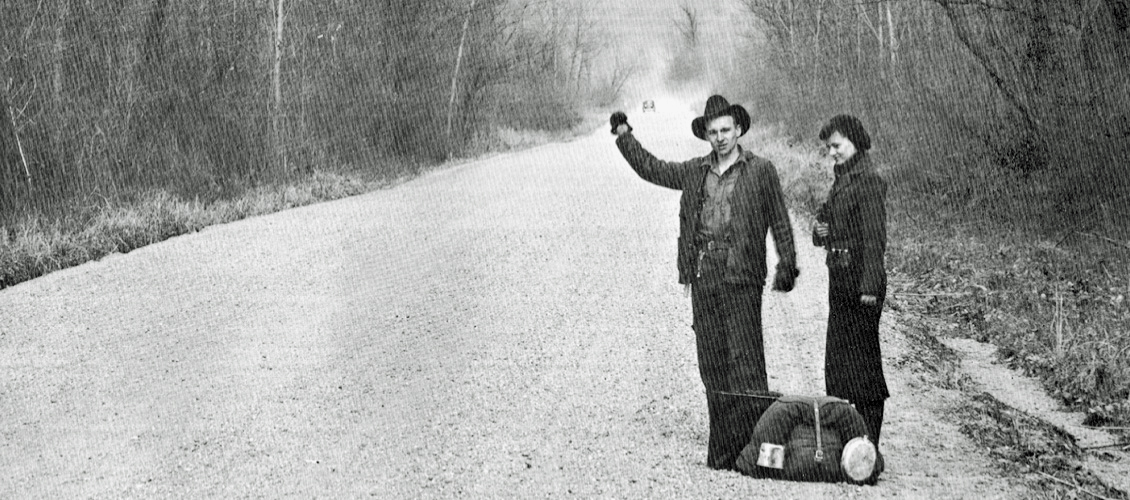 (Walker Evans Photo)
(Walker Evans Photo)
(The Hamilton Spectator – Saturday, June 12, 2021)
The sunny news from around here is that I recently drove up a regional road with the three Chumbuckets, that is my three teens, to get their COVID-19 jabs. We didn’t see any hitchhikers. Yeah, yeah, who hitchhikes anymore? Still, I like to keep an eye, you know?
One summer day – Child No. 1 was with me – we did help one, a middle-aged woman who clamoured into our vehicle with her pots and pans and riveting odour after sleeping in the bush overnight. She was thankful, naturally, and while I don’t recall where on earth she was heading, I remember the satisfied feeling during the entire interaction.
I don’t mind it. Another fine day, on Vancouver Island, after driving Victoria to Tofino, I returned south in my rental with a few passengers. One was an Indigenous woman ready to deliver a child, needing a lift to where she’d find a bed. Another, a world traveller, had left home in England years earlier. This is the wanderlust in some of the souls I’ve picked up over the years.
I get it from my own father’s ways, from when his sideburns were as large as Douglas Firs, when we kids bounced around in the back of our old, red convertible, finding nothing but a good time even if some roadside stranger joined us.
And we all need a lift sometime. Once I needed one around midnight to a garage where I slept after my first car broke down. True, fewer people thumb rides now because, for one, cars are faster and more reliable. Even so, worldwide, hitchhiking is not a lost practice.
You’ll have no problems in Europe or in more relaxed, less urban parts of North America. In Uganda I learned that if you’re stopped at some intersection, another Ugandan might even step unannounced into your car for a lift. Canada is a more like Australia, where hitchhiking has limits, depending how and where you try. Know the local laws.
Then again, in Australia it’s illegal to honk good-bye after driving from, say, a family dinner. Just saying. There’s the law. And there’s common sense. Use yours. If you see a driver with red tights, a pitchfork, and horns on his head, don’t get in his car anywhere.
But don’t live in fear, either. According to the few studies out there – from Germany and California – fears about hitchhiking aren’t based on evidence of any ongoing, serious threats. Instead, blame the slasher movies. And wider changes in culture. More and more we’re avoiding anything that’s even perceived as unsafe. This is the galloping neurosis of our time.
Which brings us back to the COVID jabs. Don’t let unfounded fears get to you. Sure, getting a vaccine might make you feel vulnerable, if not dependent. It’s okay.
Less okay is that screw-you attitude, selfish and self-defeating, shown by the confused cowboys who fear the things that they shouldn’t, but don’t fear what they should. “I’m not getting any vaccine until you can tell what it’s going to do to me,” an American on TV said not long before I took my kids for their shots.
It almost seems like a fair question, until you consider that not long ago world-changing vaccines for, say, polio or rubella or measles saved untold millions of lives. Our parents and their parents know. Despite the small risks of any vaccine, this is what vaccines will do for you, and us collectively: give herd immunity, the only route to freedom.
Having travelled outside Canada, to-and-fro for 15 years, my family has been immunized dozens of times against a long list of common and exotic diseases. So, sure, we understand how the benefits clearly outweigh any risks. And vaccine passports, to know who’s safe? Plenty of nations are preparing.
But about hitchhiking. Do keep an eye. You never know who you might meet. Think of some future interaction as a post-pandemic celebration. Imagine it, everyone hitchhiking sea to shining sea. Connecting. Reconnecting. Learning.
Because we’re all dependent on each other. For better or worse. It does seem stupidly inconvenient. But it’s true.
